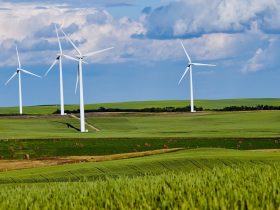In recent years, there has been a growing interest in ethical investment, with individuals and institutions seeking to align their financial portfolios with their values. One area that has gained significant attention is renewable energy. As concerns about climate change and environmental sustainability continue to rise, ethical investment in renewable energy has become an attractive option for those looking to make a positive impact while achieving financial returns. This comprehensive guide explores the importance of ethical investment in renewable energy, its benefits, and how individuals can get involved.
Ethical investment, also known as socially responsible investing (SRI) or sustainable investing, refers to the practice of investing in companies and projects that align with one’s values and have a positive impact on society and the environment. In recent years, there has been a significant shift towards ethical investment, driven by growing concerns about climate change and the need for sustainable solutions. Renewable energy, in particular, has emerged as a prominent sector for ethical investment, offering both financial returns and the opportunity to contribute to a cleaner and more sustainable future.
Understanding Ethical Investment
Ethical investment involves considering environmental, social, and governance (ESG) factors when making investment decisions. Investors seek to support companies and projects that have a positive impact on the environment, promote social equity, and demonstrate responsible corporate governance. By directing capital towards these ethical endeavors, investors can influence corporate behavior and drive positive change.
Ethical investment goes beyond simply avoiding investments in industries such as fossil fuels or tobacco. It involves actively seeking out opportunities that align with one’s values, including renewable energy, clean technology, sustainable agriculture, and social impact initiatives. By focusing on these sectors, investors can contribute to the transition to a low-carbon economy and support the development of sustainable solutions.
The Rise of Renewable Energy
Renewable energy has experienced significant growth in recent years, driven by advancements in technology, increasing environmental awareness, and supportive government policies. Renewable energy sources, such as solar, wind, hydro, and geothermal, offer a cleaner and more sustainable alternative to traditional fossil fuels.
The renewable energy industry has matured, becoming an attractive investment opportunity. As the demand for clean energy continues to rise, companies operating in the sector have the potential for substantial growth and financial returns. Investing in renewable energy not only aligns with ethical values but also presents a promising investment opportunity.
Environmental Benefits of Renewable Energy
Investing in renewable energy has numerous environmental benefits. Renewable energy sources produce little to no greenhouse gas emissions during operation, unlike fossil fuels that contribute to climate change. By supporting renewable energy projects, investors can help reduce carbon emissions, combat air pollution, and promote sustainable practices.
Additionally, renewable energy reduces dependence on finite resources, such as coal, oil, and natural gas. By investing in renewable energy, investors support the development and implementation of sustainable and long-lasting energy sources. This helps to conserve natural resources and protect ecosystems from the destructive impacts of fossil fuel extraction.
Social and Economic Impact
Ethical investment in renewable energy also has a significant social and economic impact. By investing in the renewable energy sector, individuals and institutions can contribute to job creation and economic growth. The industry requires a diverse range of skilled workers, from engineers and technicians to project managers and researchers. This creates employment opportunities and stimulates local economies.
Investing in renewable energy can also help foster energy independence. By diversifying energy sources and reducing reliance on imported fossil fuels, communities and countries can enhance their energy security. This can lead to greater stability, reduced geopolitical tensions, and improved economic resilience.

Ethical Investment Strategies in Renewable Energy
There are several ethical investment strategies available for those interested in renewable energy:
- Direct Investment: Individuals can directly invest in renewable energy projects, such as solar farms or wind turbines. This approach allows for a hands-on approach and provides an opportunity to support specific projects in one’s local community.
- Investing in Publicly Traded Companies: Investors can buy stocks or shares of publicly traded renewable energy companies. By investing in these companies, individuals can support their growth and contribute to the development of renewable energy technologies.
- Renewable Energy Funds: There are mutual funds and exchange-traded funds (ETFs) that specifically focus on renewable energy investments. These funds diversify investments across multiple renewable energy companies, providing exposure to the sector while minimizing risk.
- Community-Owned Renewable Energy Projects: Joining or investing in community-owned renewable energy projects is another way to support the development of renewable energy. These projects are often driven by local communities and provide an opportunity for individuals to actively participate in the transition to clean energy.
Research and Due Diligence
Before making any investment, it is essential to conduct thorough research and due diligence. When considering ethical investment in renewable energy, investors should consider the following factors:
- Track Record: Evaluate the track record and experience of the company or project in the renewable energy sector. Look for proven success and a strong reputation.
- Financial Stability: Assess the financial stability of the company or project. Examine their financial statements, revenue streams, and potential for future growth.
- Environmental Impact: Consider the environmental impact of the project or company. Look for certifications or recognition for sustainable practices.
- Community Engagement: Evaluate the level of community engagement and support for the project. Consider the social impact and benefits for local communities.
- Regulatory Environment: Understand the regulatory environment for renewable energy in the specific region. Consider government incentives, policies, and regulations that may affect the profitability and viability of the investment.
Investing in Renewable Energy Companies
Investing in publicly traded renewable energy companies is a popular way to support the sector and potentially achieve financial returns. When considering investments in renewable energy companies, it is important to consider the following:
- Market Analysis: Conduct a thorough analysis of the renewable energy market, identifying companies with strong growth potential and a competitive advantage.
- Financial Analysis: Evaluate the financial health and stability of the company. Look for consistent revenue growth, strong balance sheets, and a clear business strategy.
- Management Team: Assess the management team’s experience and track record in the renewable energy industry. Look for a team with a proven ability to execute and drive results.
- Technological Innovation: Consider the company’s commitment to technological innovation and research and development. Look for companies that are at the forefront of renewable energy technologies.
- Partnerships and Contracts: Evaluate the company’s partnerships and contracts with utilities, governments, and other stakeholders. These partnerships can provide stability and growth opportunities.
Renewable Energy Funds and ETFs
Renewable energy funds and ETFs provide an opportunity to diversify investments across multiple renewable energy companies. These funds pool investments from various individuals and institutions and allocate them to a portfolio of renewable energy assets. Consider the following when investing in renewable energy funds and ETFs:
- Diversification: Evaluate the fund’s diversification strategy and the number of renewable energy companies included in the portfolio. Look for funds that provide exposure to different sectors within the renewable energy industry.
- Expense Ratio: Consider the expense ratio of the fund or ETF. Higher expense ratios can eat into potential returns, so it is important to find a balance between fees and performance.
- Performance History: Assess the historical performance of the fund or ETF. Look for consistent returns and compare their performance to industry benchmarks.
- Fund Manager: Research the fund manager’s experience and track record. Consider their investment strategy and approach to sustainable investing.
- Sustainability Metrics: Look for funds that incorporate sustainability metrics into their investment process. This ensures that the fund is aligned with your ethical values and supports companies with strong ESG practices.
Community-Owned Renewable Energy Projects
Community-owned renewable energy projects provide an opportunity for individuals to actively participate in the transition to clean energy. These projects are often initiated and led by local communities, allowing individuals to invest in and benefit from renewable energy generation. Consider the following when getting involved in community-owned renewable energy projects:
- Local Impact: Assess the potential impact of the project on the local community. Consider factors such as job creation, reduced energy costs, and community engagement.
- Investment Options: Research the investment options available for community-owned projects. This could include purchasing shares or bonds or participating in crowdfunding campaigns.
- Transparency and Governance: Evaluate the transparency and governance structure of the project. Look for clear communication channels, regular reporting, and accountability mechanisms.
- Long-Term Viability: Assess the long-term viability and sustainability of the project. Consider factors such as maintenance plans, revenue streams, and community support.
- Social Engagement: Engage with the local community and participate in meetings or events related to the project. This allows for a deeper understanding of the project and its impact.
Conclusion
Ethical investment in renewable energy offers individuals and institutions the opportunity to align their financial portfolios with their values and contribute to a cleaner and more sustainable future. By investing in renewable energy, investors can support the development of clean technologies, reduce carbon emissions, and promote social and economic benefits. Whether through direct investments, publicly traded companies, funds, or community-owned projects, there are various ways to get involved in ethical investment in renewable energy. Conducting thorough research and due diligence is essential to make informed investment decisions and maximize the impact of ethical investments.

































